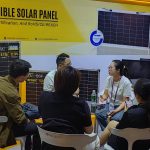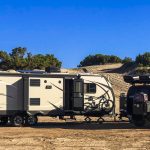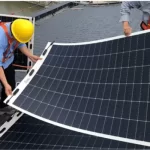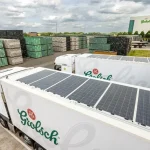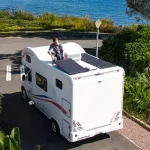Table of Contents
Solar technology offers a range of options to meet different energy needs, with flexible panels VS. rigid solar panels leading the way in providing reliable renewable energy solutions. Each type has unique benefits and applications, so it’s important to understand the differences before making a decision. This blog takes an in-depth look at their features, benefits, limitations, and how Sungold Solar stands out as a manufacturing solution for both.
materials like ETFE laminate and Patented Polymer Composites, ensuring they can withstand weight and resist wear without damaging the solar cells.
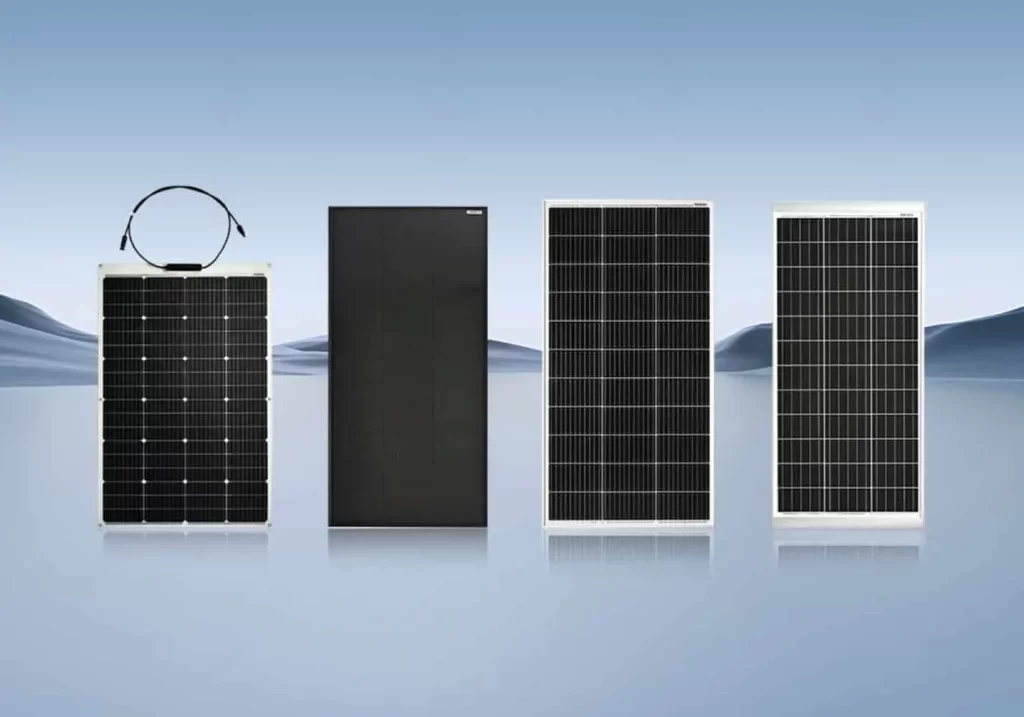
What Are Flexible and Rigid Solar Panels?
Flexible Solar Panels:
As solar energy becomes more and more popular, more and more people are using flexible solar panels instead of traditional rigid panels.Flexible or bendable solar panels are an extremely simple way to generate solar power. Flexible solar panels are lightweight and bendable, making them ideal for curved or irregular surfaces such as RVs, boats and outdoor installations. They are about an inch thick and weigh only six pounds. Installation is simple and usually requires adhesives or tape rather than complicated bracing. Due to the lack of space between the panel and the roof, excessive heat can be generated, affecting battery performance, damaging the panel and shortening its life.
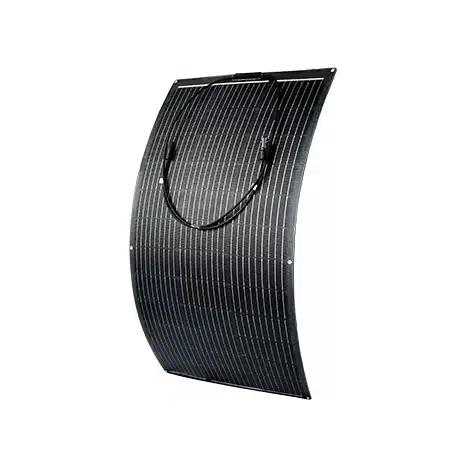
Rigid Solar Panels:
Most people think of “traditional” solar panels as rigid solar panels. Most conventional solar panels use a photovoltaic (PV) system, which consists of polycrystalline or monocrystalline solar cells that convert solar energy into electricity. In order to protect the solar cells from scratches and weather changes, traditional rigid solar panels usually consist of an aluminum frame and a glass enclosure. Rigid solar panels are traditional photovoltaic modules designed for durability and efficiency. They feature tempered glass and aluminum frames to ensure weather resistance and long-term performance. These panels are ideal for permanent installations, including rooftop and ground-mounted systems. Most rigid solar panels are fixed mounted, but some portable “suitcase” models are available. Drilling and mounting of a racking system is required.
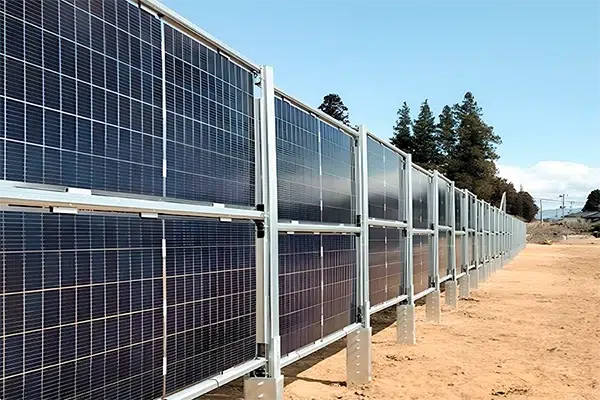
Flexible Solar Panels: Pros & Cons
Pros:
Lightweight: weighs about 20% of a rigid panel, making it ideal for weight-sensitive applications. Due to its light weight, several flexible solar panels can be installed on the roof of a car, which can improve the energy efficiency of the car, especially when there is Germany driving on the highway is a limited weight policy, then flexible panels are of course your best choice!
Flexibility: can be adapted to curved surfaces such as caravan roofs or boat decks, making them versatile.
Easy Installation: Adhesive-based installation requires no drilling or heavy hardware.
Performance and efficiency: flexible solar panels are significantly less efficient than rigid panels. Today, you can purchase flexible solar panels that are just as efficient as rigid solar panels.
As a result, flexible solar panels are an inexpensive and easy-to-install source of remote solar energy. If you regularly travel at weekends, whether by boat, van or caravan. Flexible solar panels are simple and easy to install and will be favored by weekend travelers.
Cons:
Reduced efficiency:Lack of space between the panels and the roof due to the lack of racking can lead to overheating, affecting efficiency and longevity.
Stability issues: can fall off in high winds and the lack of mounting brackets means it’s not as safe as rigid panels.
Shorter lifespan: the use of a plastic coating rather than a glass coating results in faster degradation and a warranty of 5 to 10 years. Of course, the most common life expectancy on the market is 1-5 years.
Rigid Solar Panels:Pros & Cons
Pros:
Longer life: typically lasts 25-30 years and maintains 80-90% efficiency after 25 years.
High Efficiency: Adjustable angle to maximize sunlight absorption.
Durable Construction: Protected by strong materials to withstand harsh weather conditions.
Cost: Currently rigid solar panels are less expensive, last longer, and cost less per kilowatt hour.
Cons:
Bulky and inflexible: difficult to install on weight-sensitive or irregular surfaces.
Installation complexity: requires brackets and specialized help, increasing costs.
Heavy weight: not good for carrying and installing on roofs with limited load-bearing capacity.
Flexible Solar Panels vs. Rigid Solar Panels: Lifespan and Durability
Flexible Solar Panel Lifespan
Because of the maturity and upgrading of encapsulation materials, the warranty period of flexible modules is usually 3 to 15 years, such as sungold with polymer composite encapsulation of TF series can be guaranteed for 6 years, with a patented high-impact backsheet encapsulation of a collection of polymer material encapsulation of PA621 series can be guaranteed for 10 years, etc., and the life of use can be up to 15 years; these are based on different encapsulation process determines the warranty of the module and the life of use. Life expectancy, but usually life expectancy of 5-15 years of use, but compared with rigid solar modules, life expectancy of 5-15 years of use.
However, compared with rigid solar modules, the life span is relatively short.
Rigid Solar Panel Lifespan
The degradation rate of high quality products has been 0.3-0.8% per year for the past 25-30 years.
Even after 20 years of use, they can still maintain up to 92% efficiency.
Factors Affecting the Lifespan of Solar Panels
The performance of both flexible and rigid solar panels is affected by the following factors:
. Material quality: Tempered glass and ETFE coatings, polymers, special patented backsheets and other high quality materials enhance durability.
. Environmental conditions: Extreme temperatures, high humidity and UV exposure accelerate degradation.
. Maintenance: Regular cleaning and inspections help maintain efficiency and extend service life.
Solar Panel Degradation Rates and How to Extend Lifespan
Research from the National Renewable Energy Laboratory (NREL) shows that most solar panels retain 80-90% of their original output after 25 years. Flexible panels degrade more quickly due to their thinner construction, but their lifespan can be extended by
Choosing high-quality panels: Invest in a reputable brand such as Sungold for a durable and efficient system.
Routine maintenance: Clean the panels regularly to remove dirt and debris.
Protective measures: Use covers or shields to prevent damage in extreme weather.
Using a Combination of Flexible and Rigid Solar Panels
Combining flexible and rigid solar panels maximizes energy production.
Flexible solar panels: Ideal for curved or lightweight areas such as RV roofs or boat decks.
Rigid solar panels: best suited for stationary installations that can handle inclement weather while providing high efficiency.
Final Thoughts
Flexible and rigid solar panels each have their advantages. For curved or mobile application scenarios, flexible solar panels such as those from Sungold Solar excel; for long-term fixed installations, rigid solar panels offer greater reliability and efficiency. When choosing a solar solution, a judicious mix of both types of solar panels based on specific needs will maximize energy efficiency.


